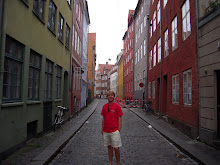The film’s opening sequence maintains the theme of contrasts, which lasts throughout the film’s entire narrative, as it follows angel Damiel on an escapist tour of the city. Damiel and the rest of the angels, whom we meet later on, have superhuman abilities: they can hear the thoughts of every passerby and selectively tune to whomever’s mental narrative they chose, they can survive without eating or drinking, they can transport themselves to different locales. And, of course, they can fly. Damiel perches atop a Berlin church, transports himself into a plane overhead, and then weaves his way between different Berlin apartments. However, Damiel’s freedom and immorality are in great contrast to the thoughts of the individuals we come across: a husband arrives at his dead mother’s home and remarks how he has felt “no grief”; a solitary, lovesick man thinks to himself how his lover "never loved [him]”; a bored child sits in his apartment, wishing there was something good on TV. Even the more lighthearted Berliners maintain their mortality and a sense of being stuck: a car packed full of immigrants, a man complaining about how women ruin life, a couple in an ambulance racing to the hospital. All of these mini stories are coated in the pensive questions that the film’s narrator poses: “why am I me, and why not you?” he queries in his rhyme. “Isn’t life under the sun just a dream?”

Damiel, despite many of these depressing insights into these smaller characters’ minds, is still fascinated with what it means to be human. When he meets up with fellow angel Cassiel, they compare the day’s story highlights. Cassiel tells morbid and bleak tales of suicides while Damiel relates the small moments, especially lighting up when he speaks of a woman who could feel his presence. But Damiel is “fed up with his spiritual existence” and longs for a human body, a more real life where he can have thoughts and feelings of his own. He wants the “now”, not the “eternity”; he wants the pleasures of small experiences, like “blackened fingers” from the newspaper and the satisfaction of a meal. Damiel is frustrated with his omniscience and perfection as well; he would like to guess from time to time, and to be wrong. Cassiel is tempted by the darker aspects of humanity: to be savage and to draw evil out of others.
This contrast between the two characters deepens as the story develops. The two eventually get involved with Marion, the acrobat who often is dressed as an angel herself, and Peter Falk, an American actor who is the star of a World War II drama set in Berlin. Marion, much like the passengers on the subway that Damiel encounters, poses large questions to herself while embroiled in her own thoughts. “How should I live?” she wonders. She desires to love and to be loved, but doesn’t know if there’s someone out there. As Damiel, unseen by Marion, sits by her side, she stares right at him. He is immediately enraptured. This infatuation with her, coupled with his ever-persistent desire to shed his wings and become human, leads Damiel to “enter the river” of the “ford of time” and cross over to the mortal side. Cassiel aids in this help but doesn’t join him, despite his sobering failure to save a man from jumping from a high building, the film’s most haunting moment.

Now, Damiel and Cassiel are visually contrasted as well: Damiel can see color, so now we, the audience, see color when following him. He pulses with excitement at these basic human experiences which he had only know about, but never experienced first hand: to bleed, to see color, to feel cold, to sip coffee. Damiel echoes the famous subject of many philosophical queries, Mary the colorblind scientist. Mary is a scientist who is trapped in a world of black and white, but knows everything physical there is to know about the color red without actually being able to experience it. When released into a world of color, she learns and experiences something new with her interaction with the color. It’s this subjective truth and understanding that Mary learns. Damiel’s understanding of color, therefore, represents the joy of subjectivity, of experiencing something for oneself. Simply put, it’s the pleasure of being an individual.
Damiel has been reborn, and this theme of newness surges through the final act of the film. “Other wings will grow in the place of old ones,” Damiel relates, making a strong commentary about the politics of Berlin at the time of the film’s creation. Damiel’s ability to move on, to advance, to jump from one world to the next—and from one wall to the next, as he wakes up right next to the Berlin wall when he is reborn—is part of the large push that Wenders was a part of to create a new Berlin, a new Germany. From the cab driver’s lecture about how there are more borders than ever to the depressing idea of “extra people” that Falk makes about the film’s Jewish extras all lead up to the final, encapsulating speech of the film that Marion gives. In a blatantly religious ceremony, where Damiel passes a cup of wine to her, she proclaims a call for action, staring straight at the camera, into the audience: “we are deciding everyone’s game,” she states. “I am ready, now it’s you. Now or Never.” She, and Wenders and Berlin and Germany, ache for unity.

No comments:
Post a Comment